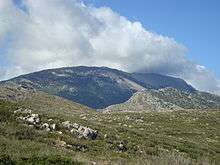Ascra
Ascra or Askre (Ancient Greek: Ἄσκρη, romanized: Áskrē) was a town in ancient Boeotia which is best known today as the home of the poet Hesiod.[1] It was located upon Mount Helicon, five miles west of Thespiae.[1] According to a lost poetic Atthis by one Hegesinous, a maiden by the name of Ascra lay with Poseidon and bore a son Oeoclus who, together with the Aloadae, founded the town named for his mother.[2] In the Works and Days, Hesiod says that his father was driven from Aeolian Cyme to Ascra by poverty, only to find himself situated in a most unpleasant town (lines 639–40):
|
He settled in a miserable village near Helicon, |

The 4th century BCE astronomer Eudoxus thought even less of Ascra's climate.[3] However, other writers speak of Ascra as abounding in corn,[4] and in wine.[5]
By the time Eudoxus wrote, the town had been all but destroyed (by Thespiae sometime between 700 and 650 BCE), a loss commemorated by a similarly lost Hellenistic poem, which opened: "Of Ascra there isn't even a trace anymore" (Ἄσκρης μὲν οὐκέτ' ἐστὶν οὐδ' ἴχνος).[6] This apparently was a hyperbole, for in the 2nd century CE, Pausanias could report that a single tower, though not much else, still stood at the site.[7]
Notes
- W. Hazlitt (1858) The Classical Gazetteer (London), p. 54, s.v. Ascra.
- Pausanias 9.29.1.
- Strabo, Geographica 9.2.35.
- πολυλήιος, Pausanias. Description of Greece. 9.38.4.
- Zenod. ap. Strabo. Geographica. p. 413. Page numbers refer to those of Isaac Casaubon's edition.
- West, M.L. (1979), "Four Hellenistic First Lines Restored", Classical Quarterly, 29: 324–6, doi:10.1017/s0009838800035953, JSTOR 638099.
- Pausanias 9.29.2.
![]()